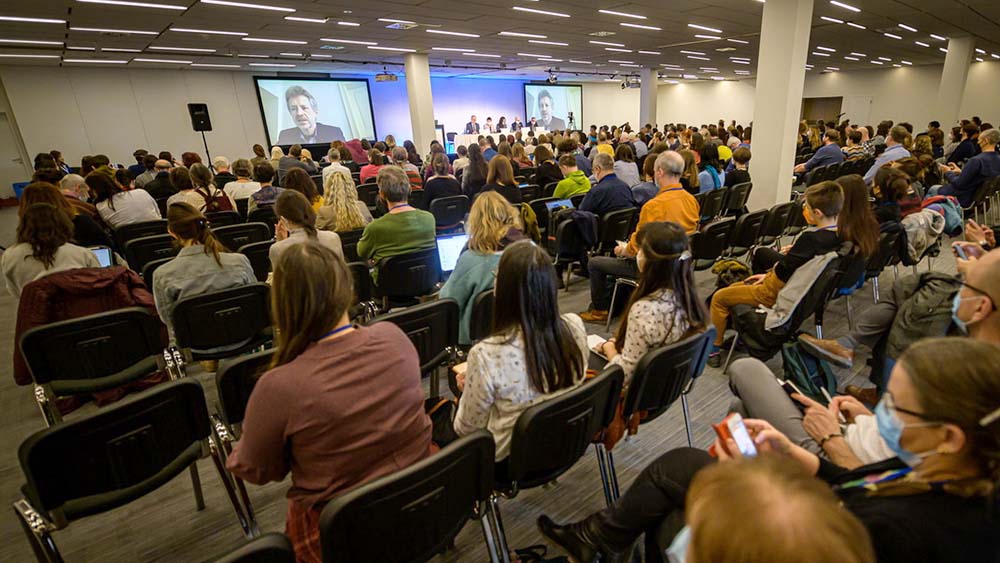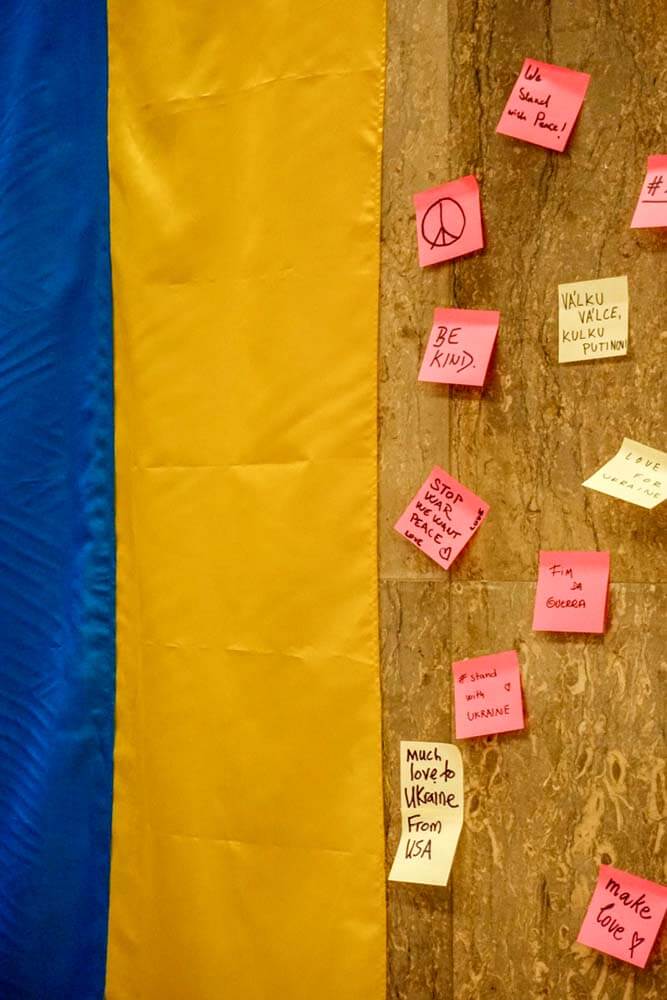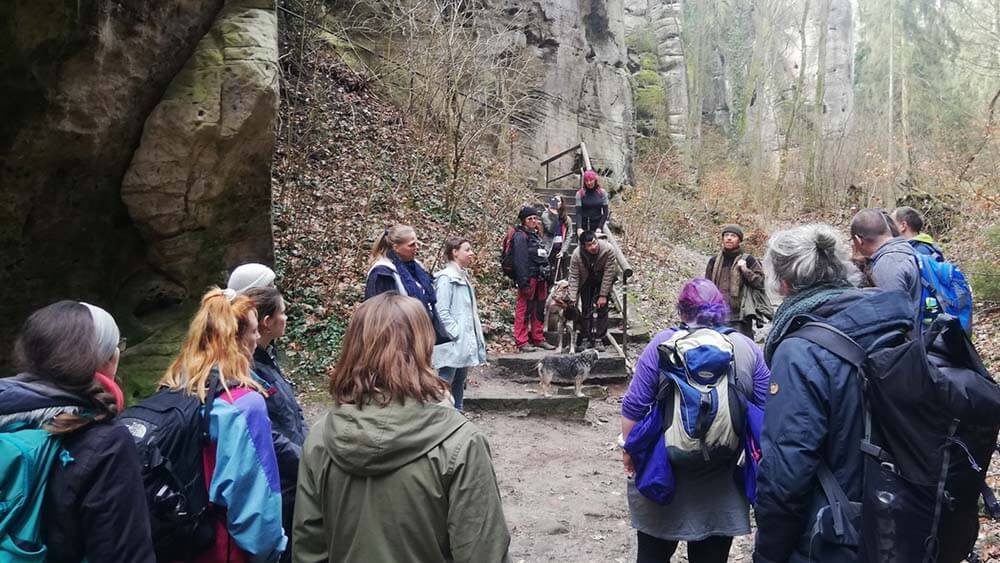
Delegates of the World Environmental Education Congress convene at the Prague Congress Centre. WEEC met in the venue’s second and third floors, while the hall and ground floor were dedicated to Ukrainian refugees.
The pandemic derailed the 11th World Environmental Education Congress (WEEC), which brings together the environmental and sustainability education community, originally planned for October 2021. Organizers — the Department of Environmental Studies at Masaryk University in Czechia, the World Environmental Education Congress Network, and professional congress organizer AIM Group International — moved the event to March 14-18, 2022 at the Prague Congress Centre. Little did they know the rescheduled event would come up against yet another humanitarian crisis: the war in Ukraine.
Only a few weeks before the March conference, the Czech government decided to open the big hall of the Prague Congress Centre to host Ukrainian refugees. While some clients who were scheduled to meet while the refugees were housed at the center — including the 48th Annual Meeting of the European Society for Blood and Marrow and the European Lung Cancer Congress — opted not to proceed with their events, WEEC organizers decided to hold the conference as planned.
“It was a brave decision, in some ways,” said Elena Alexandrová, head of AIM Prague’s congress department, in an AIM case study about the event. “Due to the official state of emergency, the government could have canceled the event from one day to another, so we planned several backup solutions,” including checking the availability of other venues in the city to host WEEC, she said. “Since the event was a hybrid format, we had the advantage of being potentially able to transform it into a fully virtual event in a worst-case scenario.”

An ad hoc “tribute” wall at the Prague Congress Centre gave World Environmental Education Congress participants a chance to convey their support for the Ukrainian people.
Working closely with the Prague Congress Centre, the organizers felt confident that delegates would be comfortable meeting at the facility — the center was split into two areas, with the hall and ground floor dedicated to refugees and the second and third floor, which has a separate entrance, used for congress delegates. Registrants were apprised of the situation and reassured about their safety in Prague, which is about 700 miles from Kyiv.
“We believe we are able to meet not only humanitarian [needs] but also our business needs,” said Lenka Žlebková, CEO of the Prague Convention Centre in AIM’s case study. “One way to offer support to those impacted and the rest of the Czech Republic, as well as Europe as a whole, [was] to go through with the planned event. We are very grateful to the organizers of the World Environmental Education Congress, who saw this as an opportunity.”
Tens of thousands of people escaping Russia’s war on Ukraine were processed at Prague’s Assistance Centre for Ukrainian refugees, housed at the congress center, before the assistance center was moved to another venue in the city in mid-April.
The five-day WEEC conference, which also was attended by government officials and representatives of business and nonprofits, drew 600 delegates from 50 countries — 450 in-person and 150 virtual participants. Making the event hybrid was “a must” for several reasons, Alexandrová said, not just in case of a potential emergency situation that would preclude the in-person event, but as a result of COVID restraints and also taking into account delegates’ personal preferences.
The first three days took place at the congress center and the last two days were spent outside in field programs at Czech environmental education centers and nature sites. (See “Outdoor Exploration” below.) An important part of the event was the Youth Environmental Education Congress, which brought nearly 150 students to Prague to explore changing environmental education from their perspective.
Lending Support
Planning was something of a nailbiter up until the very start of the event, giving organizers no time to plan a significant CSR initiative to support the refugees during WEEC. “The very last-minute information they received from the Czech government about the partial use of the congress center for refugees,” Gianluca Trezzi, AIM Group’s press and media relations officer, told Convene via email, “and the persistent uncertainty should the government have decided to occupy [the entire] congress center and cancel the in-person event until three days before the expected opening” made planning a “charity project” an impossibility.
“Although there was not enough time to organize proper support channels for the Ukrainian refugees,” Trezzi said, there were a few “very spontaneous reactions.” A kind of “tribute wall” at the congress center became a way for attendees to express their own messages of support for Ukraine with Post-It notes. Also, extra box lunches not consumed by attendees were immediately donated to the refugees at the center.
RELATED: Ukraine Humanitarian Crisis: How the Events Industry is Helping
In addition, the participants of one of WEEC’s field sessions “prepared an online petition supporting the peace in Ukraine,” Trezzi said. “The idea is to send it to relevant international educational organizations.”
The petition not only addresses the humanitarian consequences of the war but speaks to the heart of the environmental education community. According to its website, the WEEC Network “works to promote active, informed and responsible citizenship as a condition for a more peaceful, fair and ecological human society, to guarantee an equitable access to natural resources, and a harmonious relationship among human beings, other living beings and the planet.”
The online petition reads, in part: “As skilled professionals from various countries of the world, as well as labour sectors and social fields, we strongly encourage all the democratic governments, political leaders and all the people in the world to join all their effort to stop the war that has a devastating impact on human individuals, and extremely negative consequences on the environment and leads to a massive loss of cultural and natural heritage. An unprecedented attack on the human rights, sustainable way of living and protection of nature and unique cultural values must end now.”

World Environmental Education Congress delegates explore the Czech Republic’s natural beauty as part of a planned excursion. The last two days of the event took place outside at Czech environmental education centers and nature sites.
Outdoor Exploration
Two kinds of field events gave WEEC participants the opportunity to exchange practical experiences and network while exploring the host country of the Czech Republic.
Field excursions were organized by various institutions and NGOs connected or involved in the environmental education in a rather standard way, said AIM Group’s Gianluca Trezzi. “Guiding the delegates around and explaining a particular theme,” such as folk traditions and traditional crafts in environmental education, “the field sessions were an innovative format. It was actually a continuation of the congress scientific program — authors could submit their abstract for this program in the same way as for the congress part — and many oral presentations and workshops were delivered by the congress participants, coordinated by the organizing NGO.”
Attendance for each excursion was limited to 30 participants to secure an intimate, “community-style” atmosphere, Trezzi said, and allow everyone to be included in the discussion and to potentially find new partners for their future projects.
RELATED: Read AIM Group International’s case study on the World Environmental Education Congress.
Michelle Russell is editor in chief of Convene.
